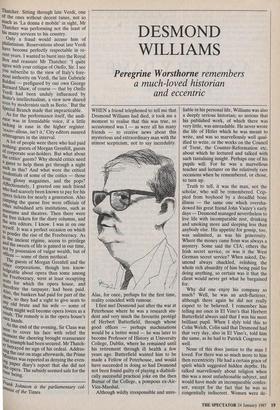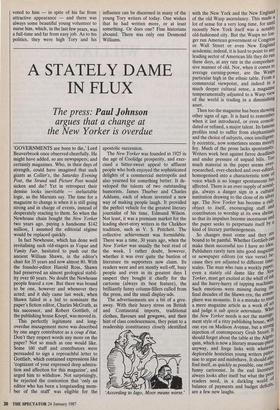DESMOND WILLIAMS
Peregrine Worsthorne remembers
a much-loved historian and eccentric
WHEN a friend telephoned to tell me that Desmond Williams had died, it took me a moment to realise that this was true, so accustomed was I — as were all his many friends — to receive news about this mysterious and extraordinary man with the utmost scepticism, not to say incredulity.
Alas, for once, perhaps for the first time, reality coincided with rumour.
I first met Desmond just after the war at Peterhouse where he was a research stu- dent and very much the favourite protégé of Herbert Butterfield, through whose good offices — perhaps machinations would be a better word — he was later to become Professor of History at University College, Dublin, where he remained until his retirement through ill health a few years ago. Butterfield wanted him to be made a Fellow of Peterhouse, and would have succeeded in doing so had Desmond not been found guilty of playing a diabioli- cally successful practical joke on the then Bursar of the College, a pompous ex-Air- Vice-Marshal.
Although wildly irresponsible and unre- liable in his personal life, Williams was also a deeply serious historian; so serious that his published work, of which there was very little, was unreadable. He never wrote the life of Hitler which he was meant to write, and was so marvellously well qual- ified to write, or the works on the Council of Trent, the Counter-Reformation etc, about which he lectured and talked with such tantalising insight. Perhaps one of his pupils will. For he was a marvellous teacher and lecturer on the relatively rare occasions when he remembered, or chose, to turn up.
Truth to tell, it was the man, not the scholar, who will be remembered. Crip- pled from boyhood by a dreadful bone illness — the same one which oversha- dowed his great friend John Vaizey's early days — Desmond managed nevertheless to live life with incomparable zest, drinking and smoking more and sleeping less than anybody else. His appetite for gossip, too, was unlimited, as was his generosity. Where the money came from was always a mystery. Some said the CIA; others the Irish secret service, or was it the West German secret service? When asked, De- smond always chuckled, relishing the whole rich absurdity of him being paid for doing anything, so certain was it that the client would never get what he bargained for.
Why did one enjoy his company so much? Well, he was an arch-flatterer, although there again he did not really expect to be believed. I remember him telling me once in El Vino's that Herbert Butterfield always said that I was his most brilliant pupil. When I slyly told this to Colin Welch, Colin said that Desmond had that very day, also in El Vino's, told him the same, as he had to Patrick Cosgrave as well.
None of this does justice to the man I loved. For there was so much more to him then eccentricity. He had a certain grace of spirit which suggested hidden depths. He talked marvellously about religion when this was a most unfashionable subject, and would have made an incomparable confes- sor, except for the fact that he was so congenitally indiscreet. Women were de- voted to him — in spite of his far from attractive appearance — and there was always some beautiful young volunteer to nurse him, which, in the last few years, was a full-time and far from easy job. As to his politics, they were high Tory and his influence can be discerned in many of the young Tory writers of today. One wishes that he had written more, or at least something. Or does one? Fine historians abound. There was only one Desmond Williams.



















































 Previous page
Previous page